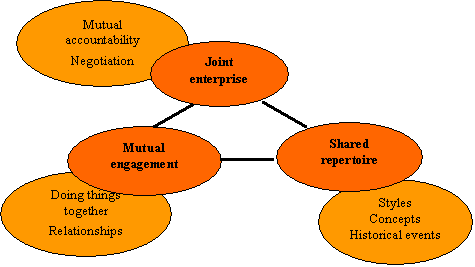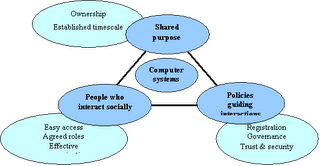We now have a complete set of draft materials for our course, which we will be reviewing and revising during the rest of the March, so that we’re ready to start the course in April. While finalising the course and planning the support, we’ve changed the order of the modules in the course. There have been subtle changes of emphasis in the modules since we published the draft course outline.
Here’s the outline as it stands now, with confirmed dates and with my personal take on what you might get from each part. We’ll post a more definitive outline nearer the start of the course.
Induction and Reception (“Module 0”) — 4-14 April
If you haven’t done an open online course like ocTEL before, it can take a little getting used to, particularly at the beginning when a lot of people are introducing themselves, sharing expectations and experiences. Hence we’ve created a “soft” introductory session to help you get familiar with how the course works, how to participate in discussions.
There will be practical activities related to Technology Enhanced Learning (TEL), but informal ones which you can use as a “sandbox” to try out alternative ways of approaching the materials and interacting with others.
This module is deliberately longer than a week to allow maximum time for this exploration. We appreciate that many people may be on holiday during the first week of April. You won’t miss anything by not joining until 8 April; you’ll just have a little less time to play.
Foundations of TEL
1. TEL concepts and approaches — week commencing 15 April
How can I use TEL to improve my teaching and learning practice? An introductory overview of the field, covering different ways technology can make learning better, online and offline. In case you thought Technology Enhanced Learning was just about putting course notes on a Virtual Learning Environment and prodding students through them, you will learn about diversity and concepts behind TEL.
2. Understanding learners’ needs — w/c 22 April
How do I take account of students’ requirements? What we know about learners’ needs in general, including digital literacy and readiness to engage with TEL. Plus how you can find out more about the specific needs of your learners, and how to ensure that teaching and learning are accessible to people with diverse needs.
3. Active learning — w/c 29 April
How do I ensure participants learn through active engagement? An overview of theories of active learning and invitation to critique them. What these mean for TEL, and how to design activities that maximise learning. When and how social media and games can help.
TEL Methods and Tools
4. Producing engaging and effective learning materials — w/c 6 May
What makes good learning materials, how to find them, how to assess them, and how to produce them. The licensing principles of Open Educational Resources and using them to make better learning experiences.
5. Platforms and technologies — w/c 13 May
How do I choose the right tech to support effective learning activities? The unique features of online, mobile and classroom technologies as learning platforms. The implications of these features map for learning, and the comparative benefits of ‘open’ and ‘closed’ technologies
6. Assessment and feedback — w/c 20 May
How do I give timely feedback and collect the evidence to support it? Theory and practice of assessment and feedback, and where technology fits into this via the range of e-assessment approaches. Choosing the types of technology that will best fit the needs of assessment and of your students.
7. Tutor and peer support — w/c 27 May
How do I design and manage support for online learners? Focusing on the roles of human, as opposed to automated, support, including how online tuition differs from face-to-face contexts. How to organise peer support and review among learners, including practising peer review.
Managing TEL
8. Maximum learning for minimum cost — w/c 3 June
What can the ‘enhanced’ in Technology Enhanced Learning stand for? Exploring techniques for making richer learning experiences without adding costs, increasing scale, reach and access, as well as improving productivity and flexibility. Assessing the opportunities of open content, free Web 2.0 tools and MOOCs (Massive Open Online Courses).
9. Cheating Murphy’s Law: expecting the unexpected — w/c 10 June
How do I keep my project or course on track by anticipating and overcoming problems. Some case studies of what can go wrong with TEL, including implementation issues, risk analysis, troubleshooting, and dealing with technology that doesn’t work.
10. Evaluating TEL — w/c 17 June
How do I tell what difference I’m making with TEL? Evaluation, research evidence and measuring impact. There will also be time to reflect on and evaluate this course, both as a general example of evaluation practice and to give us specific feedback on this first run. And we will be hosting a discussion on where you might like to go after the course, including nurturing new collaborations and outlining what ongoing support is available via ALT and other channels.
If this looks interesting and you haven’t already registered for the course, please do so now via our home page.
As this is an open course, you’re free to pick and choose from the above and do as much or as little of the course as you like.
So far we have over 300 people registered for the course, from around the world, on the back of near-zero publicity. Now that we have firm dates for each of the weeks, we’re going to do a little more publicity. Any help you can offer in spreading the word would be very welcome. Please follow us on twitter, retweet and share.
In the remaining weeks of March we’ll be blogging some more about:
- our line-up of guest contributors for the live webinars we’ll be hosting every Wednesday as part of the course;
- our approach to tutor support and what course participants can expect;
- possibly how experienced learning technologists can get involved and help us run the course (hint!)
- and possibly some more about our guiding principles in designing the course.



